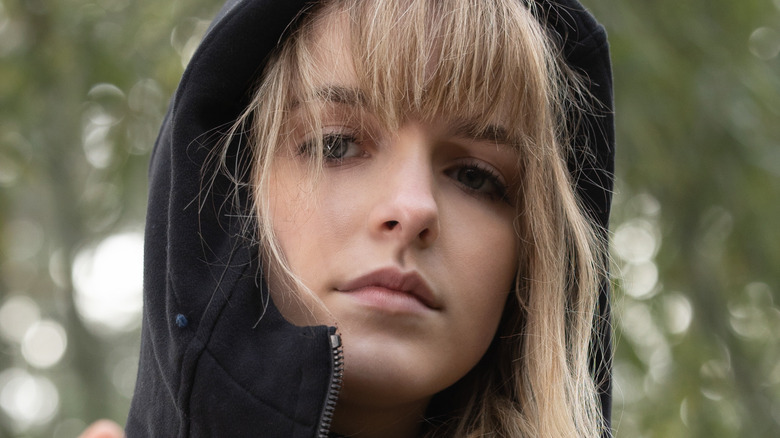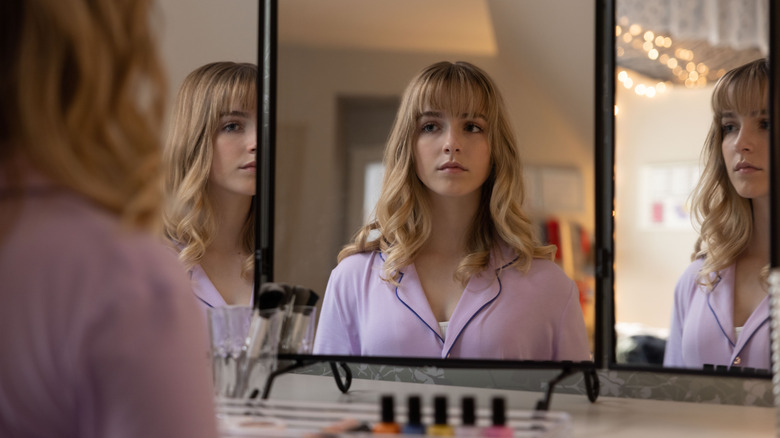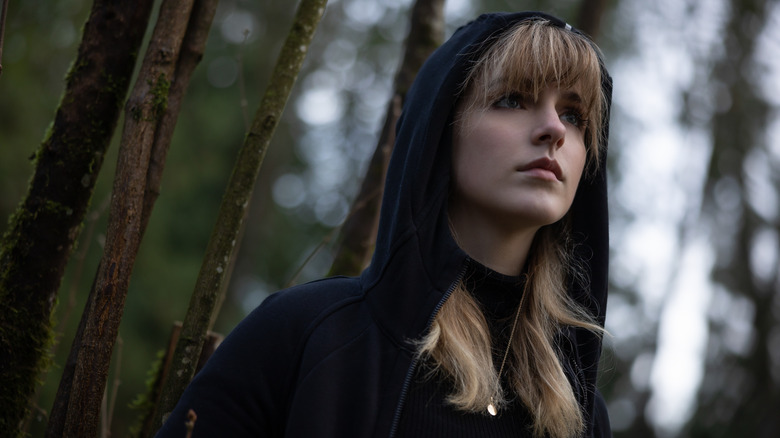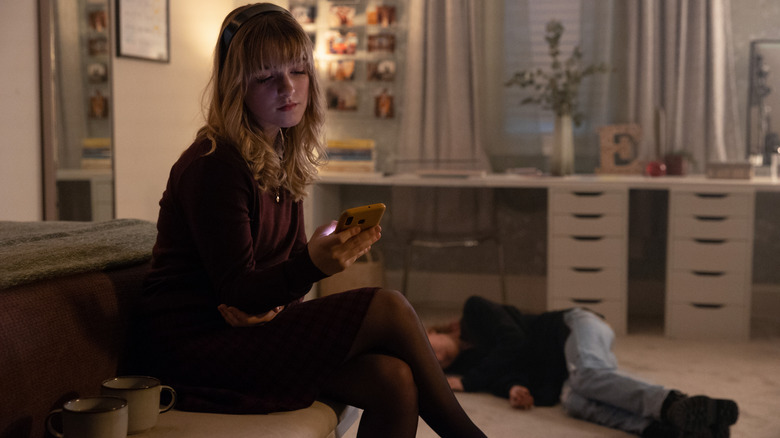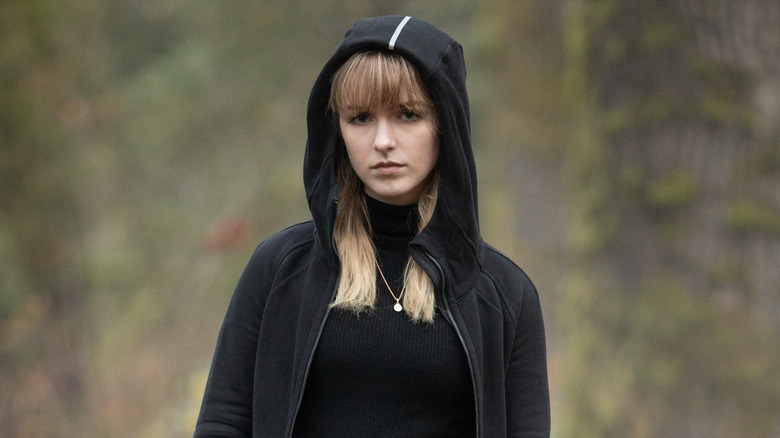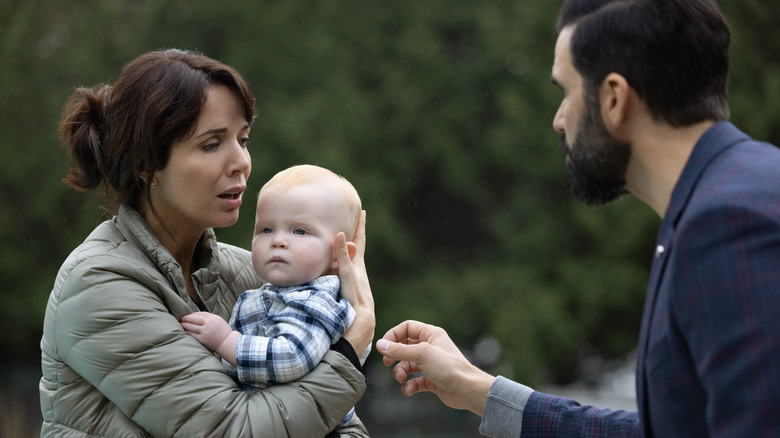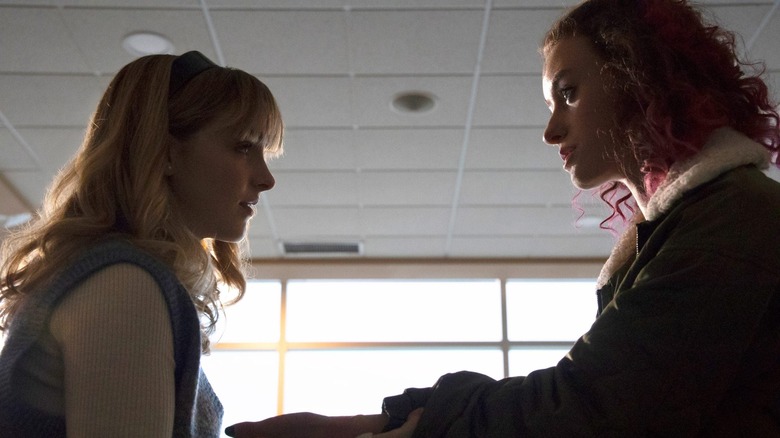Mckenna Grace And Ross Burge On Writing The Bad Seed Returns - Exclusive Interview
If you were left wondering what happened to Emma when "The Bad Seed" ended, you weren't alone. The incredible actress who plays her, Mckenna Grace, knew there was more to Emma's story — so she decided to write it herself.
Grace and her own father, Ross Burge, sat down at their computers and together wrote the upcoming sequel, "The Bad Seed Returns." In it, fans get a look inside Emma's new life while living with her aunt Angela.
Now that Emma is a teenager, however, a lot has changed in her world. She's dealing with high school cliques, her aunt's new marriage and baby, and the boy at school who has a crazy crush on her. Yet the bad seed herself honestly hasn't changed a bit: She's still out for blood.
In an exclusive interview with The List, co-writers and father-daughter duo Grace and Burge discussed the making of the sequel, what it was like to step back into Emma's shoes all these years later, and how "The Bad Seed Returns" almost ended up as a completely different movie.
What inspired them to write a sequel to The Bad Seed
What inspired you two to write "The Bad Seed Returns" together?
Mckenna Grace: We were in COVID, in quarantine, and stuck in an apartment together.
Ross Burge: March 2020 is when we started writing it. [To Grace] You were actually in Canada at the time, so when COVID first—
Grace: When we were writing it, we were together, and we were stuck in an apartment, and it came up because we both like creating stories, and we both love films and scary films and whatnot. We were like, "We should write a script. What's a script that we could write that we could get made, hopefully?" And we were like, "Well, we know they want to do a second 'Bad Seed.' What if we wrote a second 'Bad Seed' script and didn't tell them, and then just gave it to them?"
We didn't tell them. We just wrote a second "Bad Seed" and only told them about it once we had finished the script and sent it to them with a full lookbook and a pitch and everything, and everyone was like, "We haven't heard from you all in months. Wait. You all have a whole script?"
You said you were in Canada. What was your process like writing together?
Grace: We had a shared Google Doc, and we had a shared Google Slide for ... a lookbook, and we [went] back and forth between that. He has an Android, so I can't FaceTime him, so I have to WhatsApp call him. We'd WhatsApp and talk over the script and pinball ideas.
Burge: She was working on "[The] Handmaid's [Tale]" in Toronto, and I was in LA, and we were communicating that way at first. We had discussed writing it, but she had to go there probably in February, and then that's when COVID first happened. Everything got shut down. The borders were going to get shut, the US-Canadian border, so she ended up having to come back, and that's when we were at the same apartment all the time.
Grace: Yeah!
[They high five.]
Burge: We came up with the idea. Mark Wolper, who's a producer on the film, had a really good relationship with Crystal [Burge, another producer, and] Mckenna, and he was very open to ideas. He ended up mentioning something about a potential sequel when Mckenna was working on "Ghostbusters: Afterlife." At that time, she was tied up, and it was like, "Well, there's no script or anything like that, so we're here, but we just don't have time."
We knew that whenever we finally opened up with some free time. We were like, "Well, this is something that we know there's already a demand for that somebody is interested in." So we wrote a 96-page teleplay and [searched for] YouTube videos on how to write a teleplay.
Grace: [Laughs]
Burge: And download software. [Laughs]
These were the challenges of writing the script
I know you're a surgeon by day, Ross. Did any of your medical background come in handy for this script?
Burge: Yeah, initially. When you kill people—
Grace: Mark [Wolper, our producer]'s always messaging you.
Burge: You got to make it accurate. In the final film, there's things that are inaccurate, but I think that's just the way things get made.
Grace: It's movie magic.
Burge: Yeah. You have to do things on the fly and the scheduling and—
Grace: It's a movie.
Burge: And weather, and you're like, "Alright. Nope. This is just how it's going to be." But initially, yeah. Yeah, I think it helped.
Grace: Mark, our producer, was always messaging my dad and calling him, and my dad would be in surgery and whatnot, but Mark would be messaging him anyways, and he'd be like, "Hey, man. So if this happened and you'd get crushed this way, would this be like this?" And "What would happen if you broke someone's leg? What would it look like?" [Laughs] And it's like, "How would we do this?" He is always asking a bunch of questions and trying to get the info out of my dad since he's a medical professional. He's like, "Instead of hiring a medical professional, we can just consult your dad." [Laughs]
What was the hardest part about putting together this script?
Grace: It was our first time, so that was difficult in itself.
Burge: Formatting. [Laughs]
Grace: Formatting. Yeah, I let you handle that one.
Burge: Probably formatting, because we could sit and talk and come up with things and write it in a Word document, but then you actually have to put it in software that formats it, and then grammar.
Grace: Grammar. [Laughs]
Burge: I'm not an English major, but the idea part was easy. We have ideas all the time. We've started writing two other films, we've written a 10-episode series, and we have a lookbook, and we're in the process of pitching that.
The idea aspect of it was easy. It was like, "Okay, so the first one ended how? Now she's with Aunt Angela. Where can we go from there? What situations can you put her in where Emma has to be Emma?"
The sequel almost ended up as a completely different story
Were there any alternate scenes or storylines that you discussed while you were exploring the idea?
Burge: Oh, tons.
Grace: [For] our original script that we sent to Lifetime, they did have Barbara [Marshall, who wrote the first film,] come on to do a bit of a rewrite, because ours was too dark and too graphic and violent. We did have to change a good bit so that the network would let us air it, but not in a bad way. It's just really funny to think about that: that we came to them. I'm like, "My dad and I have never written a script before." Then we came to them like, "Here's your script." And they're like, "This is a little bit too ... How do I put this? Dark. We need to ... "
Burge: We had a lot of different narratives, and we ended up having to change some things, like the ending, but Barbara's great. She wrote the first script. She's amazing. She breathed life [into] or really fleshed out a lot of the other characters in the story and gave them purpose and made some other characters very interesting and gave them bigger roles. I thought it was really cool. It made it much less myopic and much less fixed on these central characters in our other narratives that we had planned and everything. I don't think we could bring it up or talk about it until after the movie comes out because it would be a spoiler.
Mckenna, were there any lines or scenes that you ended up improvising, even though you guys did write the script together?
Grace: That would've been fun. [Laughs] I should have done that. I should have said, "Let's improvise the scene."
It was fun to be on set and be able to — as not just an actor but as a writer and a producer on the film — help with dialogue, not just with my own dialogue, because I'm never really afraid if I'm on a set. Sometimes whenever an adult writes for a teenager, it doesn't always sound ... How do I say? The most natural? [Laughs]
Burge: [Laughs]
Grace: I'm not going to be walking around and be like, "Oh my gosh! Slay!" Well, I probably would [Laughs], but I always try to help a little bit, help my dialogue feel more natural if something doesn't feel right and bring that up with the director or whatnot. But it was nice to be able to help with others' dialogue as well and be able to see the dialogue in the characters that we wrote come to life, and be able to help on set on the day if something didn't feel right. That was cool.
Burge: Mckenna had free reign and permission to change all the dialogue in whatever I wrote. I'm at home in my dad shorts with New Balance kicks on in the middle of the night, going, "'Hey, cool kids,' said Emma, as she walks in." [Laughs]
Grace: [Laughs] They're so bad. Oh my God. We had a whole speech where I was like, "This is so fire."
Burge: "That's so fetch." Like, "'That's so fetch,' said Emma."
Grace: Emma said, "That's so fire, you guys. It's lit."
Mckenna Grace talks stepping back into Emma's shoes
"The Bad Seed Returns" fast-forwards to Emma's teenage years. How did it feel to step back into Emma's shoes after all these years?
Grace: It was really cool. It was really fun to be able to explore her as [a] teenager in this new social environment and how she would navigate the clichés and the social whatever it is, and try to figure out how to keep her place in a comfortable place, because it's not like she's the most popular girl in school, but she's definitely not an outcast. She's lying somewhere in the middle, where she can not draw too much attention to herself and also live a comfortable life. It's fun to try and explore and have Emma balance all of these things.
Burge: She seems like a being that constantly has to reinvent herself, and it's more like she's evolving [more] quick[ly] than other people. She's almost on a different level, and that's looking at her through her eyes, like she's the hero of the narrative. She's having to adapt and change in order to fit in.
Now she's in a different home situation, different town, different school. You see her in stark contrast to how she was in the first movie. She's much different around kids [in that] in the first one, she was a little more alienated, subdued, quiet, didn't fit in, outcast, didn't get the emotions, and in this one, she's [more of] a cool kid.
Did it feel different, Mckenna, to play her this time?
Grace: Oh, yeah. It even felt different just because I'm older now, and I can have more of an understanding [of] the character. And it felt way different because I wrote her this time. It's not like I came up with the character, but I wrote a lot of who she is as a teenager. We both did. It's cool to be able to bring that to life and come back to Emma.
Here's what fans should know before seeing the sequel
In the first movie, Emma was 9 years old, and now she's a teenager. What do you think happened to Emma between the first and second movie?
Burge: It's like she's hibernating. She's not switched on, like a sleeper cell, because [at the end of] the first one, [she goes to] live with Aunt Angela.
Grace: We pick up with Emma, and in the first scene, not to spoil anything, but there's a little doggy that she doesn't take too much of a liking to. You see that happen, and you're like, "Whoa. So is she just ... What is she? What's her motive this time? What is she doing? What was the reason?" It sets it up to seem that Emma's ... I don't know, is she just killing to kill?
Then you see she's living this comfortable life. Sure, her new uncle and the baby that her aunt Angela's had [are] not her favorite thing in the world, but she's still living the life that she wants right now. She's navigating it comfortably, chilling, getting a little kill in every once in a while, I guess, but nothing big until new problems are introduced. We pick back up whenever that happens, whenever the new problems are introduced into her life, and see how she deals with that as a teenager all these years later.
Burge: If you see the baby coming into it ... There was a period of time where it was Emma and Angela, and that's what Emma thrives on: people making their worlds about Emma. She needs that. She wants to build a circle around her so that her world's pristine. Then the uncle gets introduced into it, and then they have a baby, so she's progressively getting more uncomfortable with it. And she's curated this social circle at school, and it goes from there. You're stacking up dominoes to fall.
In a potential third film, what would you like to see Emma do?
Burge: We have to do it [about] 15 years from now, because she gets elected president.
Grace: [Laughs]
Burge: That's what [the writer of the first film] Barbara Marshall ... We were joking around in a different interview [that] if she continues on this path unchecked, there's no stopping Emma. Who knows what she's going to do?
Grace: We'll see. I feel like there's so many fun ways that you could take Emma. So many different roads.
What's next for this father-daughter duo
What projects are coming up for you guys next?
Grace: Well, my dad's upcoming projects are surgeries next month. [Laughs]
Burge: [Laughs] Yeah, I got to go back to work.
Grace: We've been writing. We've still been writing. We're working on a series right now. We're working on writing a series, and we're in the midst of pitching that. We're still writing other films, coming up with ideas all the time.
We're in Atlanta [this year] because I'm shooting a limited series for Peacock, which is really fun. I've been having a great time, and I have some other things on the horizon.
Burge: And you're doing music.
Grace: And I'm doing music. I am always doing music, but we're hoping to have more things like this and to work on more scripts and films that we've created. I think it's really cool to be able to do that together.
This interview has been edited for clarity.
"The Bad Seed Returns" premieres on Labor Day (Monday, September 5) at 8 p.m. (7 p.m. CT) on Lifetime.
